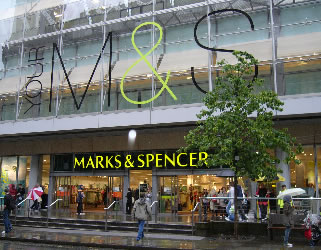After three successful years as the chief executive of Morrisons, Mr Bolland heads now to Marks & Spencer. The retail giant spent a year looking for a new CEO before finally choosing the 'flying Dutchman' this week. Now expectations are high, since his nickname is not only related to his origins in the Netherlands, but also because of the good he has done to Morrisons. Bolland was barely known in the market before taking the job there, however after reverting the supermarket's downturn tendency in profits, ongoing at that time, he is believed to move M&S forward in the current turbulent scenario.
I read this story in 4 major sources: The Guardian, the FT, the Daily Mail and The Independent.
In general, they sounded pretty optimistic in their views, but it is still noticeable the different approaches used.
Browsing the Financial Times website I could find 3 articles on this topic. Two were pieces of news and the other was from a column. Andrea Felsted was the correspondent for both of the news. In the first one, she kept a rather informative tone and apart from mentioning the variation in the share prices (up for M&S and down for Morrisons) she highlights his trajectory, even pointing out the critics made so far about the fact that is a "food man", meaning he could have trouble with the new job. Her second article "Bolland must wear two caps at M&S" informs about how the new CEO will have to deal with the position he has at Morrisons until January (end of the fiscal year), after the announcement has been made. In this one right from the beginning she does not sound totally in favour of the deal, or at least not in the way it was made. She quotes him in the previous months and alerts for the vast choice M&S had. On the other hand, still at the FT website, Andrew Hill dedicates his column to state all the good reasons for choosing Bolland, in a rather optimistic article.
The Guardian and the Daily Mail did not differ that much in their approaches. They both published simple texts to relate this new fact. As expected, there was a generous part dedicated to explain who Marc Bolland is and what he has done. The Mail gives an enthusiastic tone to this story, from Sir Stuart Rose fashions M&S top job for Marc Bolland (headline) to the sensationalism from the short statements below. The Guardian remains more formal throughout the article, however they both sounded pretty optimistic, mentioning only Bolland's achievements so far, and not the possible negative aspects - like Ms Felsted did for the FT.
The Independent, as a good tabloid, talks about the City's response to the announcement in a quite exaggerated way, after the markets reacted really in favour of M&S. As well as numbers, there is a big space for the Mr Bolland's history in the business.
Therefore, after reading all these sources my opinion is that Marks and Spencer should benefit from the fact that it will have a good CEO, recently proved by the Morrisons experience. After all, a supermarket who had profit troubles since 2004 saw its financial health back as Marc Bolland stepped in. As the other piece of news from the Independent says "Morrisons reveals growth 'well ahead' of rivals" and that is why I believe even though it seems clear that Bolland is not really experienced in the clothing and other sectors that are also in M&S, the ones that should be more cautious are from Morrisons, in order to choose the right new CEO and not fail after Mr Bolland is gone.
The Financial Times:
The Guardian:
Daily Mail:
The Independent:



